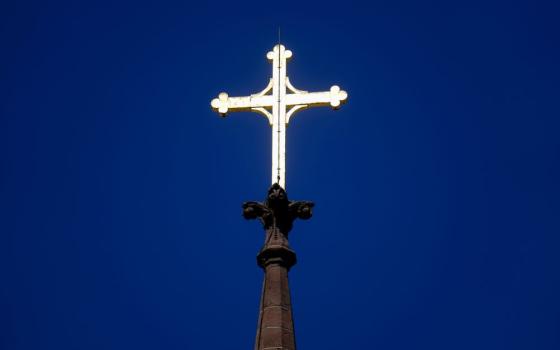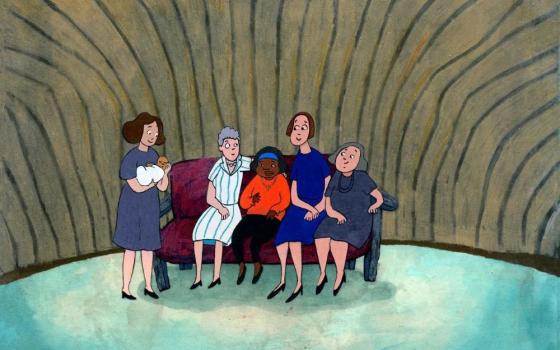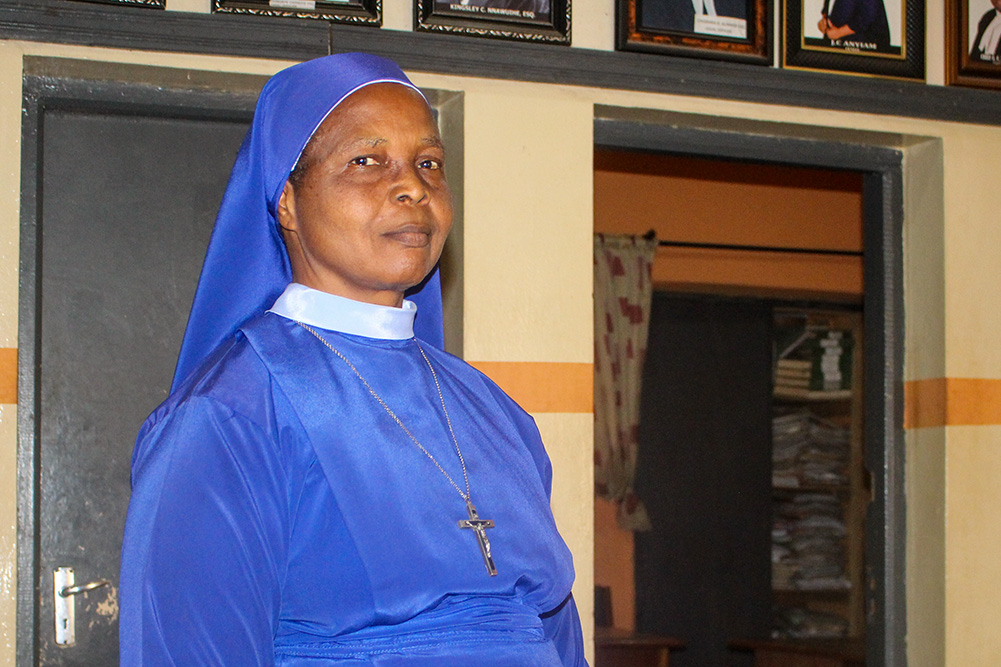
Sr. Chioma Onyenufoh, a member of the sisters of the Daughters of Mary Mother of Mercy, joined the Catholic Institute for Development, Justice and Peace in 2012 to provide for the material and spiritual needs of inmates across Nigeria. (Valentine Benjamin)
Daughters of Mary Mother of Mercy Sr. Chioma Onyenufoh joined the Catholic Institute for Development, Justice and Peace in Enugu in 2012 to provide for the material and spiritual needs of inmates languishing in detention facilities across Nigeria.
Onyenufoh is the third of five children. She was born into the family of Cosmas Chukwuyenrenwan Onyenufoh, a civil servant in Uli, a town in the southeast of Ihiala Local Government Area in Anambra State, where she completed her elementary and secondary education.
She completed her tertiary education at the Enugu State University of Science and Technology and graduated with a Bachelor of Science in social work in 2008. She also studied health and physical education at the University of Nigeria and earned a Master of Science in 2019.
Onyenufoh told Global Sisters Report that a fundamentally flawed system is perpetuated across all branches of government, and Nigeria is facing a significant incarceration crisis. State prisons are overcrowded, dirty, outdated and offer poor medical attention. According to World Prison Brief, the prison population is more than 81,000 as of June 2025; at least 66% of inmates are still awaiting trial.
Onyenufoh said the criminal justice system is slow and corrupt, leading to cases dragging on for years. She added that in desperate situations, relatives often have to sell their land to cover legal fees, all in the hope of speeding up the process.
Advertisement
Many state governments have neglected the welfare of inmates, showing no interest in whether they receive proper meals or care. "Their only concern appears to be merely maintaining the existence of prisons, with no effort to ensure humane conditions within correctional facilities," she said.
Onyenufoh spoke with GSR about Nigeria's incarceration crisis and her work with the Catholic Institute for Development, Justice and Peace.
GSR: Can you tell us about your work?
Onyenufoh: My work as a welfare officer involves visiting correctional facilities in Enugu and other parts of the country to engage with inmates. I interact with them, offer prayers, and address their spiritual and health needs. I also assist with material support and counseling.
For inmates whose families are unaware of their incarceration, I help locate their relatives and facilitate reintegration after our legal department has secured their legal representation, which often results in their release.
In cases where family members are reluctant to reconnect, I advocate on behalf of inmates. Sometimes, I succeed, but other times, my efforts fall short. There have been instances where relatives assume their loved one has passed away after a prolonged absence, not realizing they are imprisoned.
We also conduct Sunday Masses and distribute holy Communion, which signifies the profound expression of God's love and grants them immense gifts of freedom and mercy.
What's your assessment of the Nigerian prison system, often characterized as a place of suffering and despair?
It's not truly a place of no return, as the government has set up a system where most condemned individuals don't end up facing execution. In Nigeria, the government has ensured that no one will be killed; they either die of natural causes or eventually find a way to leave prison.
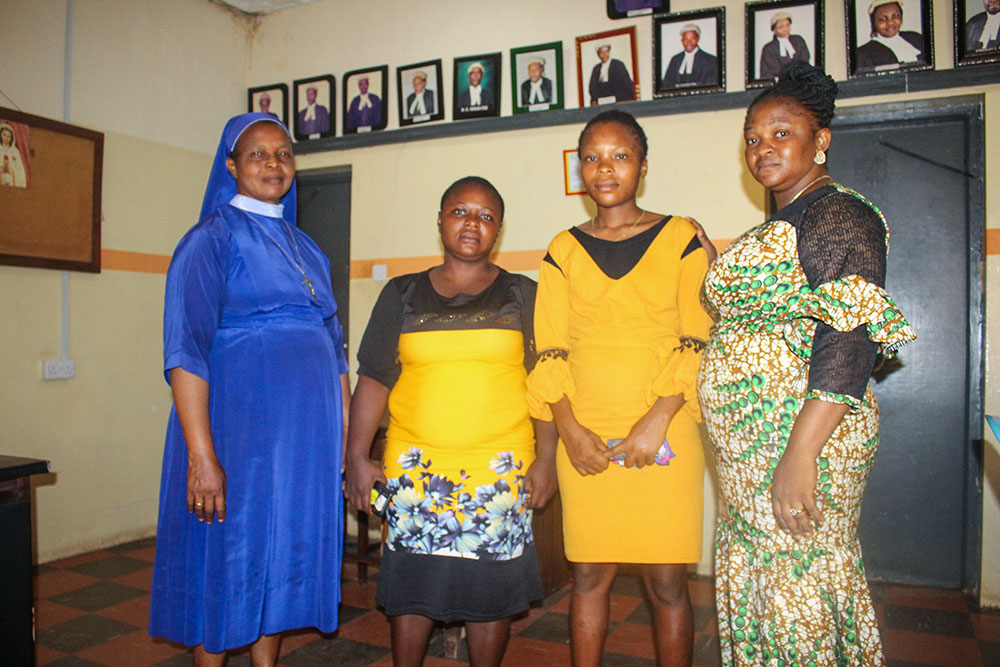
Sr. Chioma Onyenufoh, far left, and Kelechi Agu, far right, both in the welfare department of the Catholic Institute for Development, Justice and Peace, pose for a photo with pro bono beneficiaries Chioma Onwuniko and Chinaza Obi. (Valentine Benjamin)
However, the Nigerian government tends to be slow or silent regarding prison conditions. For instance, in Enugu, the prison was once well-constructed, accommodating no more than 300 inmates, but now nearly 3,000 individuals are crammed inside.
Unfortunately, the church often pleads with the government to grant amnesty or intervene. Although they promise to show up and help, they rarely do so.
Do you think correctional centers in Nigeria are fulfilling their intended purpose?
No, I don't think so. They aren't accomplishing anything meaningful. They're simply living up to their name without genuinely fulfilling their role.
You provide inmates with sacraments and other services. Can you share more about this?
I provide sacraments when needed, explaining their significance and benefits, especially to those who may have never received the sacrament of baptism. Even for those who have, there might be confusion about its meaning.
Through our interactions, I teach them that many of their problems can be alleviated through faith in God, and we help them receive sacraments that they can use in prayer.
In cases of ill health, some inmates may not receive necessary medical care from the government, or if they do, it might not be administered properly by warders. My office often provides me with funds to purchase medication for them. In cases where I can't procure the drugs, the inmates or their relatives sometimes will give me money to buy the necessary medicines, which I then pass on to trustworthy authorities who ensure they receive their treatment.
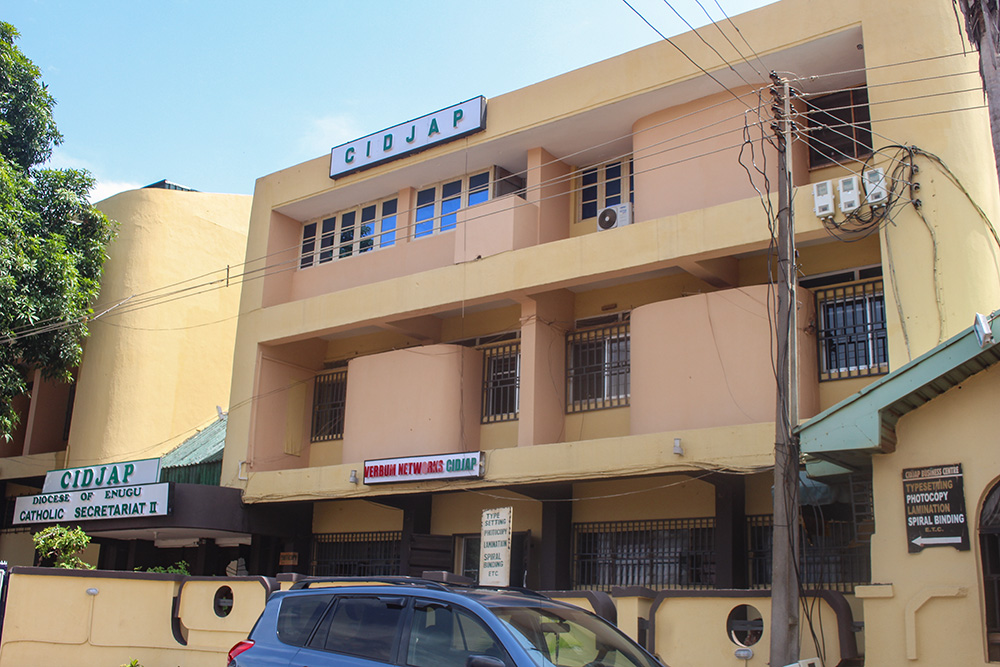
The Catholic Institute for Development, Justice and Peace in Enugu, Nigeria (Valentine Benjamin)
Our presence serves as a spiritual exercise, helping inmates realize that God cares for them. Before our visits, many inmates were living without any spiritual connection. By being there, we draw them closer to God and cultivate a sense of belonging within them.
Of what importance is receiving Communion, participating in the sacraments and attending confession for the incarcerated?
It's crucial for many inmates because they often live "a false life" and are driven by the desire for money and material wealth. Many weren't taught right or wrong; they merely pursued a way to live large without understanding the consequences of their choices.
By teaching them about the spiritual dimensions of life, many begin to repent and reflect on their past actions. For those who haven't received the sacrament of baptism, this journey often leads them to attend catechism and ultimately receive baptism and even confirmation. Through these practices, they draw closer to God, and despite being confined, they can find happiness, knowing their souls have been liberated from their past ways.
Not all inmates embrace this opportunity for change, but those who do and choose to repent express gratitude for the insight they've gained into their previous lives. They share that even if they were to die after repenting, they would find peace knowing they've made amends rather than leaving this world without having sought forgiveness.




